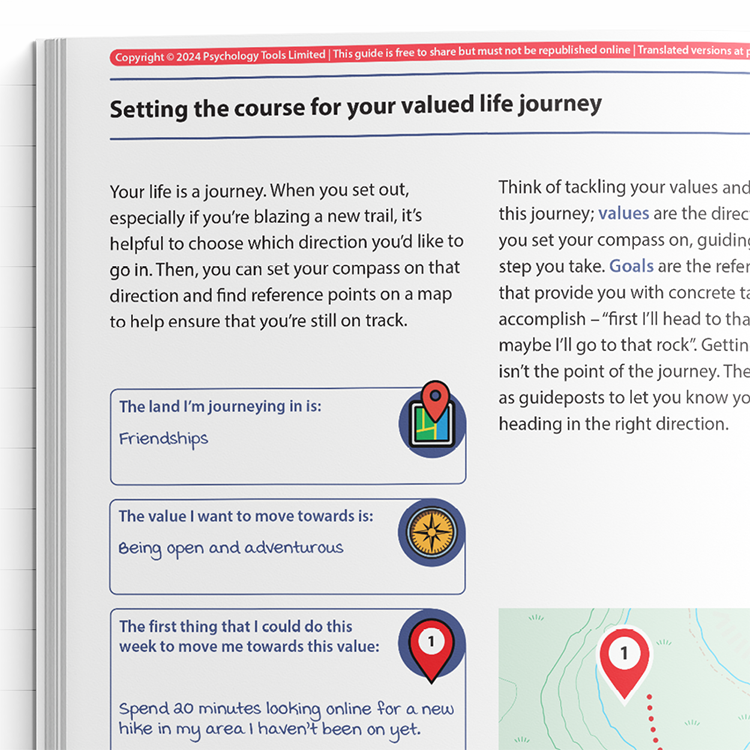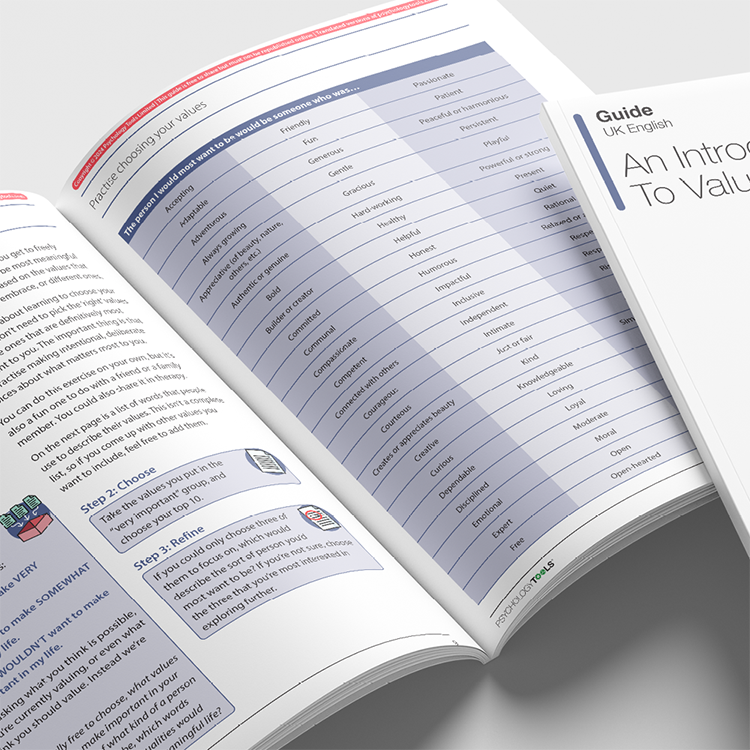Free Guide (PDF)
A free psychoeducational guide. Typically containing elements of skills development.
Developed in collaboration with Dr Jenna LeJeune, the guide is an abridged version of Values: Connecting To What Matters, and is available for free! The full version includes more exercises and information to help readers refocus on achieving a well-lived life. Sign up for a free trial account to access this guide.

A free psychoeducational guide. Typically containing elements of skills development.
To use this feature you must be signed in to an active account on the Advanced or Complete plans.

People’s lives feel unfulfilling or directionless if they’re not guided by values. This free guide, based on concepts from acceptance and commitment therapy (ACT), equips the reader with tools to help clarify their values and integrate them into their lives. It emphasizes the importance of living a value-driven life over merely attempting to avoid pain.
Integrating the principles of values in therapy is essential for helping clients move beyond symptom management to a life enriched with meaning and purpose. This free guide helps therapists facilitate conversations about values in a structured and engaging manner, offering pathways to understanding and prioritizing what truly matters to clients.
Moving towards what matters can create meaning and mitigate feelings of hopelessness.
Shifting focus from avoidance to proactive engagement with values.
Provides tools for rebuilding a life grounded in core values post-trauma.
Beneficial for clients seeking clarity and direction in various aspects of life unrelated to specific diagnoses.
Start by exploring clients’ existing understanding of values.
Help clients identify areas in life where they wish to focus on values, such as relationships or personal growth.
Use exercises to engage clients in actions that move them toward their values.
Encourage regular reflection on the alignment between daily actions and core values.
Adjust therapeutic approaches based on continuing discussions about values.
Work collaboratively with clients to overcome barriers in pursuing their values.
Reinforce the concept that living aligned with values improves life satisfaction.
Acceptance and commitment therapy (ACT) emphasizes the importance of values as central to psychological wellbeing and behavioral change. In ACT, values are defined as freely chosen, verbally constructed life directions — ways of living that matter deeply to the individual (Hayes, Strosahl, & Wilson, 2016). Unlike goals, which are finite and achievable, values are enduring qualities that can guide behavior across contexts and over time.
Living in alignment with one’s values enhances psychological flexibility, the core aim of ACT. Psychological flexibility refers to the ability to act effectively in the service of one’s values, even when faced with internal obstacles such as difficult thoughts, feelings, or memories (Hayes et al., 2006). This stands in contrast to experiential avoidance — the attempt to control or avoid distressing experiences — which has been linked to poorer mental health outcomes (Kashdan & Rottenberg, 2010).
By helping clients move toward what matters — rather than away from what hurts — this guide fosters sustainable therapeutic change grounded in values, not avoidance.

Just enter your name and email address, and we'll send you [Free Guide] An Introduction To Values (English US) straight to your inbox. You'll also receive occasional product update emails wth evidence-based tools, clinical resources, and the latest psychological research.
Working...
This site uses strictly necessary cookies to function. We do not use cookies for analytics, marketing, or tracking purposes. By clicking “OK”, you agree to the use of these essential cookies. Read our Cookie Policy